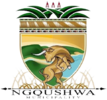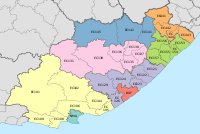Ngqushwa Local Municipality
Ngqushwa | |
|---|---|
 Location in the Eastern Cape | |
| Coordinates: 33°12′S 27°07′E / 33.200°S 27.117°E | |
| Country | South Africa |
| Province | Eastern Cape |
| District | Amathole |
| Seat | Peddie |
| Wards | 13 |
| Government | |
| • Type | Municipal council |
| • Mayor | Mnikelo Tempile Siwisa (ANC) |
| • Speaker | Nombuyiselo Ethelina Magingxa (ANC) |
| • Chief Whip | Fumanekile Phumaphi (ANC) |
| Area | |
| • Total | 2,241 km2 (865 sq mi) |
| Population (2011)[2] | |
| • Total | 72,190 |
| • Density | 32/km2 (83/sq mi) |
| Racial makeup (2011) | |
| • Black African | 99.2% |
| • Coloured | 0.2% |
| • Indian/Asian | 0.1% |
| • White | 0.4% |
| First languages (2011) | |
| • Xhosa | 94.7% |
| • English | 2.6% |
| • Other | 2.7% |
| Time zone | UTC+2 (SAST) |
| Municipal code | EC126 |
Ngqushwa Local Municipality is an administrative area in the Amatole District of the Eastern Cape in South Africa.
Main places
The 2001 census divided the municipality into the following main places:[4]
| Place | Code | Area (km2) | Population |
|---|---|---|---|
| Amahlubi | 21501 | 25.88 | 1,095 |
| Amambalu | 21502 | 64.29 | 144 |
| Bhele | 21503 | 71.60 | 5,626 |
| Dabi | 21504 | 9.96 | 1,010 |
| Glenmore | 21505 | 13.18 | 1,373 |
| Hamburg | 21506 | 3.30 | 193 |
| Imidushane | 21507 | 345.41 | 15,216 |
| Imiqayi | 21508 | 176.73 | 14,947 |
| Mareledwana | 21509 | 243.17 | 10,774 |
| Mhala | 21510 | 101.29 | 5,355 |
| Mpheweni | 21511 | 0.28 | 27 |
| Msuthu | 21512 | 70.89 | 4,515 |
| Ngqushwa | 21513 | 158.71 | 233 |
| Njokweni | 21514 | 86.22 | 4,667 |
| Peddie Part 1 | 21515 | 653.47 | 10,791 |
| Peddie Part 2 | 21517 | 9.77 | 3,696 |
| Tyefu | 21516 | 211.15 | 4,583 |
Politics
The municipal council consists of twenty-three members elected by mixed-member proportional representation. Twelve councillors are elected by first-past-the-post voting in twelve wards, while the remaining eleven are chosen from party lists so that the total number of party representatives is proportional to the number of votes received. In the election of 3 August 2016 the African National Congress (ANC) won a majority of twenty seats on the council. The following table shows the results of the election.[5][6]
style="width: 2px; background-color: #006600;" data-sort-value="African National Congress" | style="width: 2px; background-color: #852A2A;" data-sort-value="Economic Freedom Fighters" | style="width: 2px; background-color: #DCDCDC;" data-sort-value="Independent (politics)" | style="width: 2px; background-color: #005BA6;" data-sort-value="Democratic Alliance (South Africa)" | style="width: 2px; background-color: #008718;" data-sort-value="Pan Africanist Congress of Azania" || Party | Votes | Seats | ||||||
|---|---|---|---|---|---|---|---|---|
| Ward | List | Total | % | Ward | List | Total | ||
| ANC | 17,686 | 19,199 | 36,885 | 84.4 | 12 | 8 | 20 | |
| EFF | 1,662 | 1,830 | 3,492 | 8.0 | 0 | 2 | 2 | |
| Independent | 1,865 | – | 1,865 | 4.3 | 0 | – | 0 | |
| DA | 572 | 638 | 1,210 | 2.8 | 0 | 1 | 1 | |
| PAC | 133 | 119 | 252 | 0.6 | 0 | 0 | 0 | |
| Total | 21,918 | 21,786 | 43,704 | 100.0 | 12 | 11 | 23 | |
| Spoilt votes | 432 | 495 | 927 | |||||
References
- ^ "Contact list: Executive Mayors". Government Communication & Information System. Archived from the original on 14 July 2010. Retrieved 22 February 2012.
- ^ a b "Statistics by place". Statistics South Africa. Retrieved 27 September 2015.
- ^ "Statistics by place". Statistics South Africa. Retrieved 27 September 2015.
- ^ Lookup Tables - Statistics South Africa
- ^ "Results Summary – All Ballots: Ngqushwa" (PDF). Independent Electoral Commission. Retrieved 8 December 2016.
- ^ "Seat Calculation Detail: Ngqushwa" (PDF). Independent Electoral Commission. Retrieved 8 December 2016.


